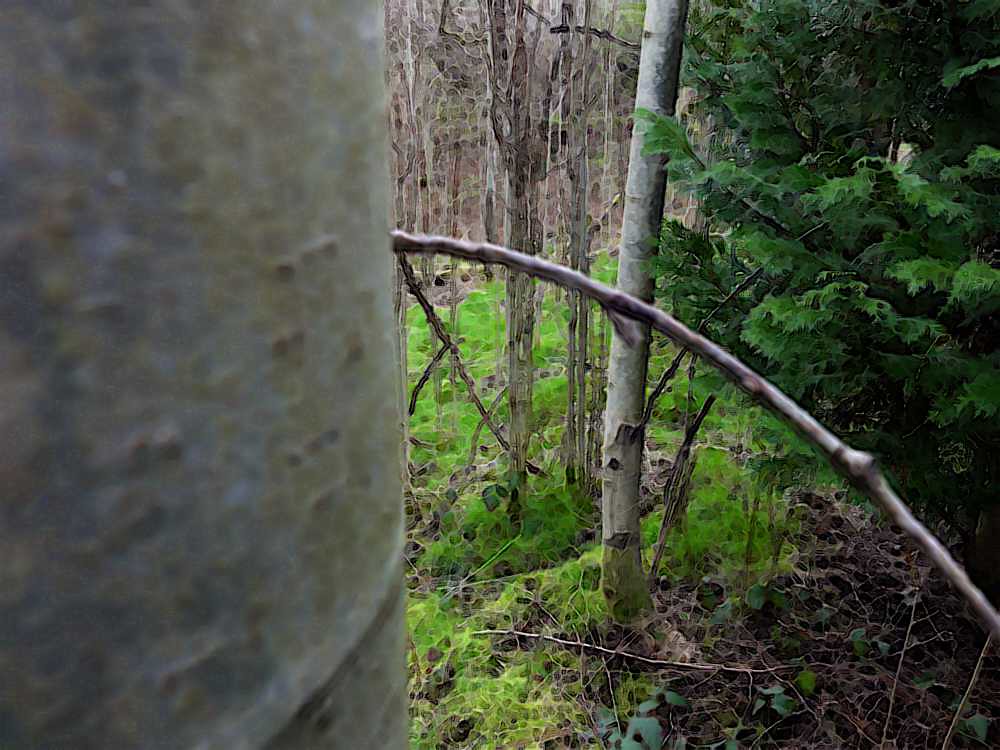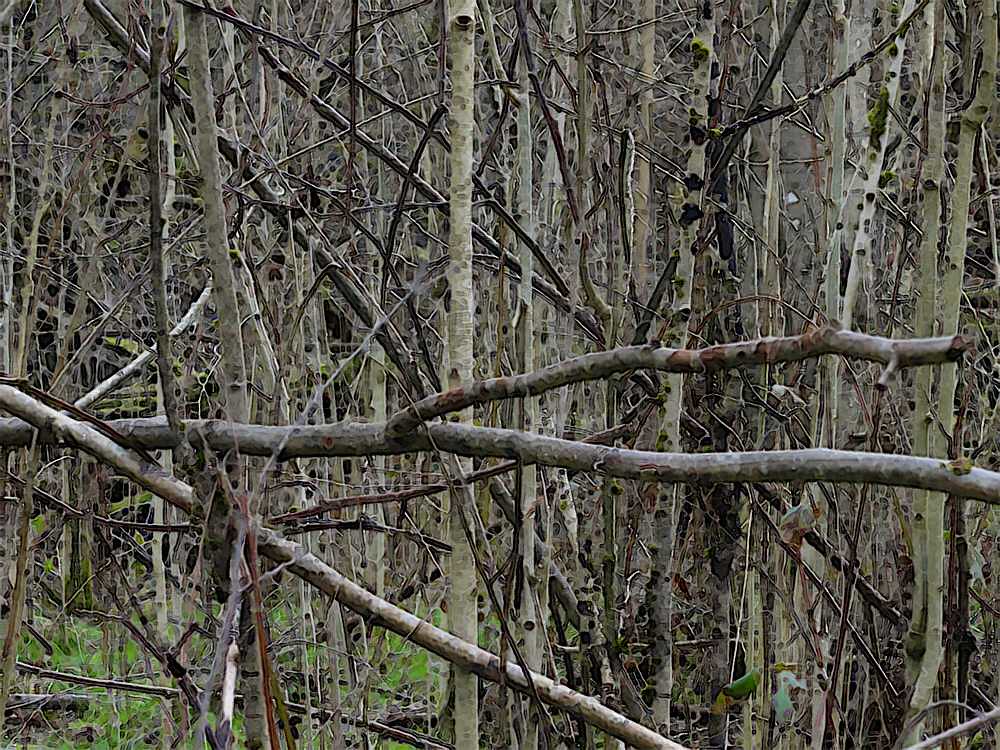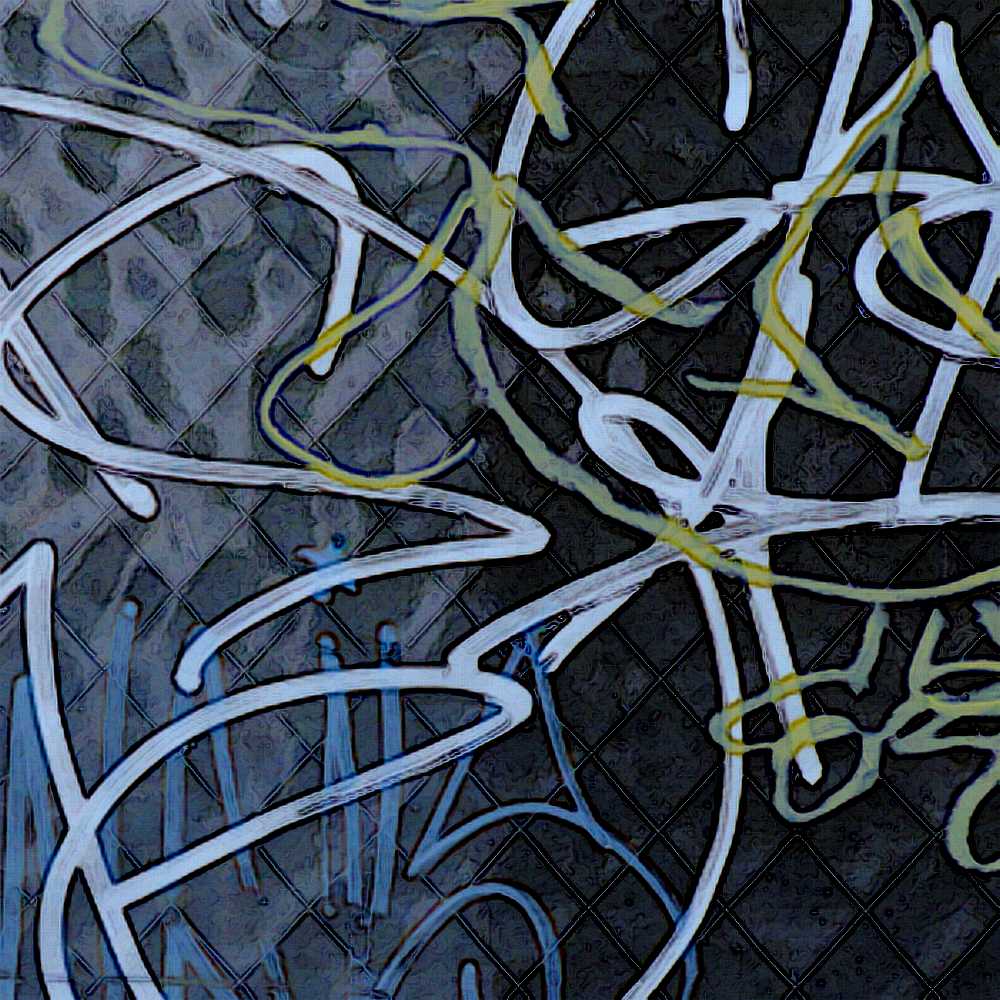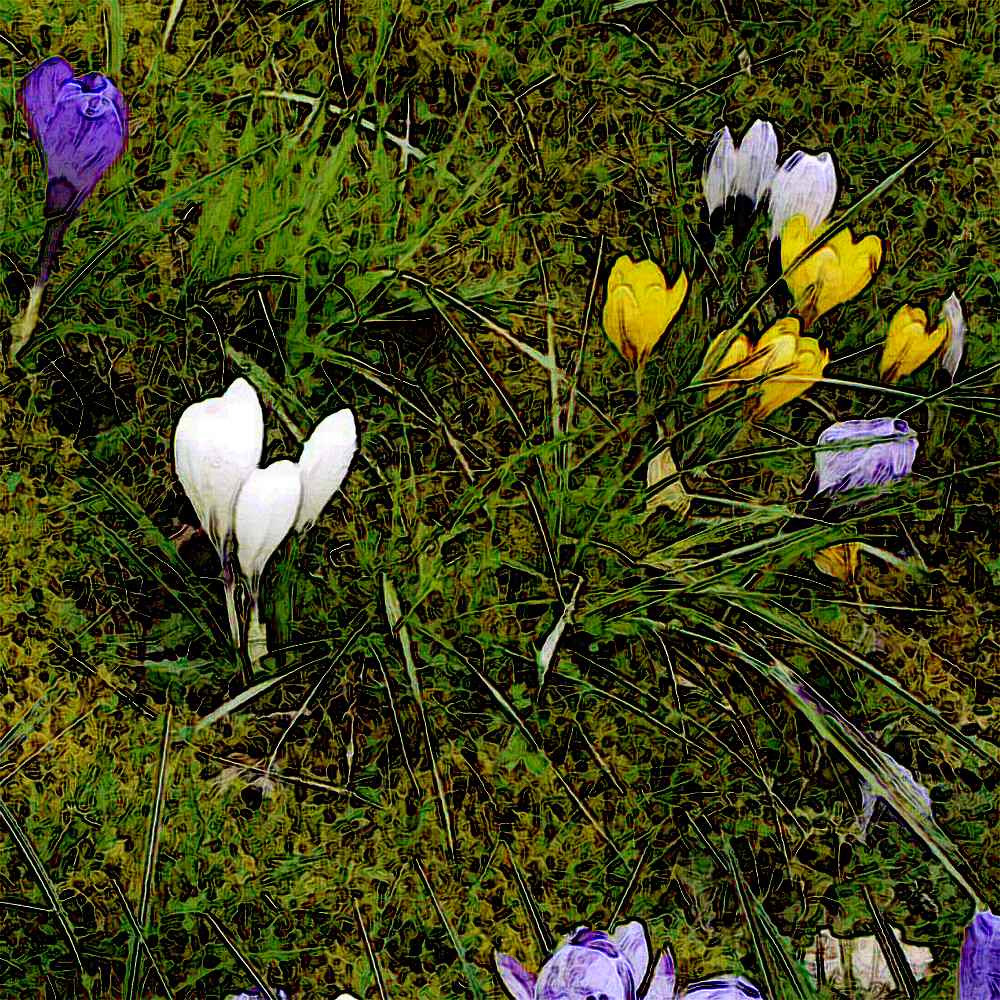
Thursday, March 31, 2011
Wednesday, March 30, 2011
Monday, March 28, 2011
Sunday, March 27, 2011
Friday, March 25, 2011
Sunday, March 20, 2011
Another Junk Mail Day
First day of spring though.







Another walk to the post office and back. Really, truly the first day of spring, though each day is spring in my heart when my pockets are full of hamsters.
Friday, March 18, 2011
Springk
I'm likin' the lichen.

Me walk to post office today. Me get new thingy what I ordered. Me now able record noise. Me cool, eh?

Me come home again. Me see drippy bush. Me have camera. So me make pichurz. Me like.

Some is flowers. Some is lichen. All same me. All good. Spring here in two day. Me can't wait.
Howz by you then?
Friday, March 11, 2011
Wednesday, March 02, 2011
1491
Birth, death, war, and desperation in the new hemisphere.

- Title: 1491: New Revelations of the Americas Before Columbus
- Author: Charles C. Mann
- Publisher: Vintage
- Length: 465pp (hardcover)
- ISBN-10: 1400032059
- ISBN-13: 978-1400032051
- At Amazon.
- Review by Tim Leffel.
You know, 1491 is a prime number.
Not mathematically, but historically.
Life on any day of that year was like a day on the beach just before a tsunami. The next year, 1492, initiated a frenzy of death.
If others have told this story before, better, more thoroughly, more rigorously, and in a more entertaining way, fine.
But I don't think so.
I like this book. I didn't know how ignorant I was. Now I do. It's good to learn.
The life of Europe officially hit the West in 1492, and hit hard. I know the unbelievable stories of the random handful of freebooters and psychopaths who brought down empires with their few bands of drunken miscreants, a horse or two, and firearms.
But they didn't. Diseases preceded all of them. European diseases. Which killed as much as 95% of the inhabitants.
Disease swept all the western hemisphere before most of it had even heard of the strange beings who reeked of filth and were so hairy they were mistaken for animals. Those who became the new masters of two continents.
"The earth's population in the beginning of the sixteenth century was about 500 million. ... Disease claimed the lives of 80 to 100 million Indians by the first third of the seventeenth century. ... The epidemics killed about one out of every five people on earth. ... It was 'the greatest destruction of lives in human history.'"
And what came before?
"In 1491 the Inka ruled the greatest empire on earth. Bigger than Ming Dynasty China, bigger than Ivan the Great's expanding Russia, bigger than Songhay in the Sahel or powerful Great Zimbabwe in the West Africa tablelands, bigger than the cresting Ottoman Empire, bigger than the Triple Alliance (as the Aztec empire is more precisely known), bigger by far than any European state, the Inka dominion extended over a staggering thirty-two degrees of latitude -- as if a single power held sway from St. Petersburg to Cairo."
What?
"Not the least surprising feature of this economic system was that it functioned without money. True, the lack of currency did not surprise the Spanish invaders -- much of Europe did without money until the eighteenth century. But the Inka did not even have markets. Economists would predict that this nonmarket economy -- vertical socialism, it has been called -- should produce gross inefficiencies. These surely occurred, but the errors were of surplus, not want. The Spanish invaders were stunned to find warehouses overflowing with untouched cloth and supplies. But to the Inka...it was all part of the plan. Most important, Tawantinsusy 'managed to eradicate hunger,' the Peruvian novelist Mario Vargas Llosa noted. Though no fan of the Inka, he conceded that 'only a very small number of empires throughout the whole world have succeeded in achieving this feat.'"
The story presented in this book is thin on North America west of the Mississippi River. Europeans simply got there too late. Very much too late. The die off had hit around two centuries earlier. The author also does not have much to say about southern Central America. Since I am still deeply ignorant of most things I don't know the answer to that.
But much of what Europeans did find existed because of the tens of millions who had created it. The sweeping, rich, open, hardwood forests of the east, the Great Plains, and many other aspects of the continent didn't just happen. They weren't the results of natural processes.
I have hiked wilderness, and lived in it for weeks, but wilderness is a false notion. There never was such a thing. Lands in North America were deliberately burned on an annual schedule. Species were selectively hunted and thinned. The land was made useful, but in ways that even today the Old World mind still hasn't realized.
If you want to know what North America was like you can read that part of the book. Or if you want to know about western South America. Or the Olmec, the Zapotec, the Mixtec, the Toltec of northern Central America.
You can read about Tenochtitlán, capital of the Mexica: "Tenochtitlán dazzled its invaders -- it was bigger than Paris, Europe's greatest metropolis. The Spaniards gawped like yokels at the wide streets, ornately carved buildings, and markets bright with goods from hundreds of miles away. Boats flitted like butterflies around the three grand causeways that linked Tenochtitlán to the mainland...Even more astounding than the great temples and immense banners and colorful promenades were the botanical gardens -- none existed in Europe. The same novelty attended the force of a thousand men that kept the crowded streets immaculate." A miracle to those who had grown up wading ankle-deep in Europes' sewer-like streets.
You can read about all that, but I want to mention something else.
I saw Werner Herzog's "Aguirre, the Wrath of God". That was enough. Enough of the Amazon.
It was as close as I ever wanted to get to the Amazon Basin. Loosely based on Gaspar de Carvajal's insane journey of despair and betrayal, the movie "Aguirre" made me relish the clean, hard-frozen winters of the northern Plains. Ice and wind yearly sweep the land clean of mold, mildew, slime, slithering things, and all creatures with sucking parts.
I have no desire to spend my last few days, in the Amazon, covered in a blanket of mindless crawling things with twitching feelers, multiple legs and ever-clicking mandibles. While the sky is dark with poisoned arrows.
Or I didn't used to. (And am still arrow-shy.)
The Amazon, aside from Antarctica, which is a hopeless and blank desert of emptiness and ice, must be the original wilderness, you think. A leafy urschleim.
You have to think that. The Amazon may only be, can only be, must only be the original land in its most basic state where humans were never meant to be. It is a place which, once entered, can never be left again, except by passing through a digestive system. You think.
So let's talk about that.
The oldest pottery in the Western Hemisphere dates from around 6000 B.C. It was found in the Amazon Basin. "By about four thousand years ago the Indians of the lower Amazon were growing crops -- at least 138 of them." And most were trees. Maybe 80% of them were trees.
Yeeps?
"The Amazon's first inhabitants laboriously cleared small plots...but...they planted selected tree crops along with the manioc...'Visitors are always amazed that you can walk in the forest here and constantly pick fruit from trees,' Clement said. 'That's because people planted them. They're walking through old orchards.'"
Again: Yeeps?
Peach palms, for example, which yield an extremely oily fruit rich in beta-carotene, vitamin C, and protein. Its pulp can be made into tortilla-like cakes. Fermented, it becomes beer. Its wood is hard enough to make saws from. Per acre, these trees are more productive than rice, beans, or even that miracle crop of the world, maize.
"People domesticated the species thousands of years ago and then spread it rapidly, first through Amazonia and then up into the Caribbean and Central America."
"The 'Stone Age tribespeople in the Amazon wilderness' that captured so many European imaginations were in large part a European creation and a historical novelty; they survived because the 'wilderness' was largely composed of their ancestors' orchards."
But the most surprising story of all, one that is only beginning to be understood, is radical terraforming.
Literally.
The ancient peoples of the Amazon created earth. Not the planet, but the earth they farmed. They created it. They invented the process for making it. And it is possibly the most valuable farming technology ever. Clark Erickson, a University of Pennsylvania archeologist, has said that "the lowland tropical forests of South America are among the finest works of art on the planet".
Impenetrable wasteland? No.
"Amazonian Indians literally created the ground beneath their feet." Called terra preta do Índio, it might cover as much as 10% of the Amazon Basin, an area the size of France. Over centuries of intensive farming, amid all the tropical rainfall and flooding, the soils steadily improved. In some places, old plots like this are dug up and directly sold as potting soil.
The secret, discovered so long ago now, is charcoal. One of the secrets.
Organic matter sticks to charcoal. Excrement, offal, plant waste, and anything else that might contribute to the soil was dumped on it. And millions of pieces of pottery, some appearing to have been produced solely so it could be smashed and scattered across the fields, holding the soil in place, aerating it, and shielding it from the hammering tropical downpours.
"Faced with an ecological problem, the Indians fixed it. Rather than adapt to nature, they created it. They were in the midst of terraforming the Amazon when Columbus showed up and ruined everything."
This is a good read.
More:
- Milpa.
- Terra preta.
- Aguirre, the Wrath of God.
- Charles C. Mann.
- "Italy Before Tomatoes, Ireland Before Potatoes, and Thailand Before Chilies".
- Martín Chambi photo. Peru, 1920's?
- Martín Chambi photo. Peru, 1920's?
Tuesday, March 01, 2011
A Tale Of Pre-Security
Deja voodoo all over the place.
I want to leave the country. Legally. At least for a while. It's a thing.
I might hike or something.
To do that I need a passport.
Last week I checked at the post office to find out the days and hours I could do this.
The man I talked to said I'd need a photo. I knew that. He said it would cost $110. I knew that.
He said there was a $25 fee. I didn't know that, but OK.
To confirm I said "So that's $135." No, he said, $110 plus $25. "$135, right?" I said, hopefully.
He said that the passport fee was $110 and there was a $25 processing fee. I wrote all this down, added it up, and came to $135, which seemed to make sense to me.
He seemed dubious.
The hours were OK: Monday through Friday, from 10 a.m. to 3 p.m.
So far so good. He reminded me that I'd need a photo. Twice. (Three times in all.)
So far so good.
A few days ago I went back.
I was wearing pants.
And I had:
* The official form, filled out.
* $135 in cash, since I didn't want to mess with a check or credit card, which were both listed as options, on the form.
* Two photos, as required, in the correct size.
* An official birth certificate.
The form asked for my parents' full birth dates, but I only know the years so I just put them in. I hope it's good enough. I believe only terrorists know really detailed information like day of birth and month of birth, and normal people don't. I'm trying hard to seem normal so I think that's in my favor. We'll see.
The clerk saw that I had already signed the form and told me I'd have to come back in three years, after getting a spanking, because I shouldn't have.
He was right. On line 1476B, subsection 18, in bold, 3-point type it says not to. I'm a naughty one, I guess, but he pulled out a scrap of paper and had me sign it while he watched. He said that would work too.
This was obviously a test. And not just an ordinary test, but a two-part test.
First, to prove that I knew what a pen was.
If I had grabbed the pen and immediately poked both my eyes out, I'm sure I would have failed, oh so miserably.
Second, to prove I could write, I guess. I can, I could, I did, signing my very own name again, successfully.
I passed. OK so far.
Time to pay.
I offered $135 in cash.
No. They don't take cash.
There are two fees: $110 and $25. They have to be two separate transactions. The first one is $110. To pay that I had to buy a money order with cash, at a cost of $1.10, print my name on it and hand it back to the clerk.
I tried not to.
I tried giving him my credit card. He said it was good for only $25. But I could pay with a check if I wanted.
No. I had brought cash so I wouldn't have to do any of this stuff, but after a while we got it worked out. Meaning that we did it his way.
$110 in cash, plus $1.10 in cash, and then he gave me the money order, and then I handed back the money order.
On to the next part, also involving money. Yay!
The clerk accepted cash for the $25 fee, without twitching, while I held my breath. But he forgot to make me kiss his ring, which I'm having some guilty feelings about now. I should have reminded him. We'll see. I hope it doesn't come back to me later. I am on camera not kissing any rings at all.
Then.
He cut my photograph in two. I had brought two images on one sheet of photo paper, and handed them over, then he cut one off and gave it back to me. He said I could keep it for my records. But I have a mirror in my bathroom, which fills all my needs, so. What?
I reminded him that I was supposed to bring two. It's on the form. Bring two identical photographs. It's on the form.
He said they don't do that any more, so I should keep the second one. (The form lied to me. Nasty lying form. We isn't trusting it again, ever. Nasssssty form. We isn't ever trusting it again.)
While the clerk was mutilating my photograph I casually remarked that it's a good thing I'm not the kind of guy who, about now, would be standing there waving his arms and screaming. He didn't say anything. I'm not sure he heard me. Or maybe he was thinking how bitchin I looked in my 2x2-inch photo.
Probably not.
I don't think he was that impressed. I guess I just didn't come across as funny, or threatening, or bitchin. Anyway, I wasn't trying to be funny.
Then the clerk disappeared.
I had my credit card out, floating around. I had one stray floating photo, and that had to be recaptured too. And I had another piece or two of paper, plus two receipts, one for $110 and one for $25, signifying the two transactions, you know.
But I had no driver's license.
You have to bring one.
For identification.
I'd had it out, and I didn't want to lose it, because, you know....
And now I couldn't find it.
After a while the clerk came back and handed it to me. He had gone off to make a photocopy, which I hadn't known, because he's a mumbler. A really, really good mumbler.
In fact it was only then that I realized why I hadn't been able to understand any more than every third or fourth word. Because he must have been one of the best of the best. A mumbling instructor.
They ARE the best of the best.
I imagined him at the front of a room. A room full of chairs, and in each chair a fresh, shiny clerk in training, and he was teaching each of them how to talk like you talk when you have a whole cheeseburger in your mouth. But he didn't have one.
I know.
I had him open his mouth and stick out his tongue and there was no cheeseburger in there. Anywhere.
He's a pro.
I could never, ever be that good.
But we got past it. You lean how to do that in relationships, so we worked, and got past it.
Only one thing left.
For some reason he had to check my birth certificate and find my birth date. I'm not sure why. It could be his hobby. But he got it wrong. He found the date I applied to get the copy, which is on there, and it says "December 23, 2010".
And that confused him. I'm way too young.
I directed him to the birth date line but it still, to him, seemed wrong. Somehow.
I told him that I should write Harry Shearer about how my day went but I don't think he heard me. Or he didn't care. Or he thought I was bluffing. Or doesn't know who Harry Shearer is. Not that Harry Shearer would care.
I'm just this guy, you know?
But it passed. We moved on.
The clerk decided that my birth date was my birth date and read it out loud. Four or five times.
I began to feel proud. My birth date, I think, must be a really good one.
It may have been a first for his collection, especially since I'm from a very small, really goofy state that has more cow poop than electricity.
He seemed pleased by all this in his expressionless, mumbling way.
Almost done. I had only to gather up my collection of waste paper and receipts, and leave.
While I did this the clerk told me that the process will take three to five weeks. He said this at least four times, except that once he said four to six weeks.
I think he wanted to see if I was paying attention.
I was paying attention.
Helpfully, the clerk finally informed me that if I want to know about the progress of my passport application I can check the web site. I pull out my receipts, looking them over for a tracking number while asking if there is a tracking number I can use.
No.
I am free to go to the web site and search around. Somewhere. Somewhere at the web site of the State Department there will be a place that will tell me where to go, and then if I want to, I can go there.
Fine, I said. I'll keep that secret close to my heart.
I said this with feeling. And I will do it too. I will keep this secret so very close to my heart, and cuddle with it whenever I am feeling lost and hopeless, or chilly.
That was it. I was told I was done.
Next I get to meet the TSA. I can't wait. I hear they're nice.
But first, "Quit whining. It ain't that bad," someone said, over my shoulder.
And that is exactly what the clerk then repeated. In fact, those were the clearest words he spoke, to which I replied "Oh, yeah?"
Directly following this we engaged in a reasonably short arm wrestling tournament (best one out of one) to settle our differences, which we did, pretty quickly, although there was too much grunting and screaming for my taste.
Who won isn't relevant, but I'd like to say right now that these injuries are taking a lot longer to heal than I'd hoped. I can still barely even use a spoon to feed myself, let alone the cat.
I have no idea when this cat showed up. I didn't used to have a cat, but he's a good conversationalist, and has been nice about licking my scabs to keep them from cracking. He's a good napper too, which I admire.
Sir! Mr. Clerk, Sir! (I have to call him that from now on) and I did part amicably though (I am legally required to say that). In fact, in a gesture of magnanimity, or possibly of pity (either works for me) he let me test-lick a whole new line of stamps that will be available soon: peach, plum, persimmon, cinnamon-ginger beer, and spicy green apple, in handy denominations from 47.25 cents up through $22.37 (for those larger, fatter letters full of legal documents, and for passport applications).
So.
That's all taken care of.
Now I guess I just wait for the FBI to kick my door down.
If they don't, I'm free to go.
Have extra info to add?
If the commenting system is out again, then email sosayseff@nullabigmail.com
Me? Yeah, right.











